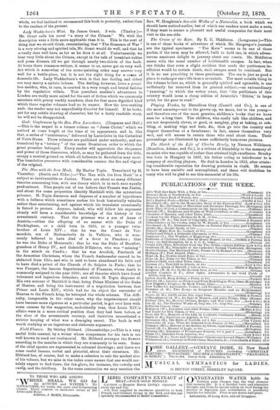The Alan with the Iron Mask. By Marius Tapia. Translated
by H. Vizetelley. (Smith and Elder.)—" The Man with the Iron Mask" is a subject as inexhaustible as Junius. There are about as many different theories concerning him, with one theory which is in each case equally predominant. Nine people out of ten believe that Francis was Junius, and about the same proportion identify Matthioli with the mysterious prisoner. M. Topin discusses and disposes of a number of hypotheses with a fullness which sometimes makes his book historically valuable rather than entertaining, and against which his translator occasionally is forced to protest. Anyone, indeed, who will follow his argument closely will have a considerable knowledge of the history of the seventeenth century. That the prisoner was a son of Anne of Austria,—either the offspring of an amour with the Duke of Buckingham, or a child born in 1635, or a younger twin- brother of Louis XIV. ; that he was the Count de Ver- mandois, son of Mademoiselle de la Varner°, who is com- monly believed to have died of a fever in Flanders ; that he was the Duke of Monmouth ; that he was the Duke of Beaufort, grandson of Henry IV., and Gabrielle D'Estrdes, who was " missing "
in the attack on ; that he was Avediek, Patriarch of the Armenian Christians, whom the French Ambassador caused to be abducted from Chio, and who is said to have abandoned his faith and to have died a priest of the Church of St. Sulpice in Paris ; that he was Fouquet, the famous Superintendent of Finances, whose death is commonly assigned to the year 1680; are all theories which have found vehement and ingenious defenders, and which M. Topin disposes of. His own account of Matthioli is that, being Prime Minister of the Duke of Mantua, and being the instrument of a negotiation between that Prince and Louis XIV., which had for its object the surrender of Mantua to the French king, he betrayed the whole scheme. The diffi- culty, insuperable in the other cases, why the imprisonment should have become more rigorous at a particular period, is got over here with some success by the suggestion, undoubtedly true, that Louis XIV.'s affairs were in a more critical position than they had been before, at the close of the seventeenth century, and therefore necessitated a stricter keeping of what was a damaging secret. The book is well worth studying as an ingenious and elaborate argument.






























 Previous page
Previous page